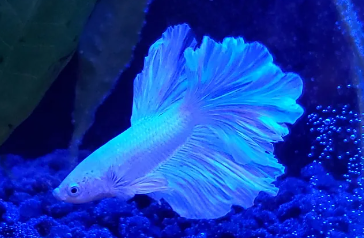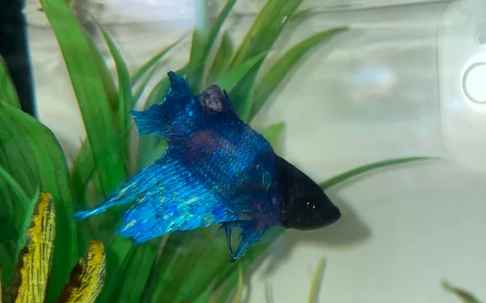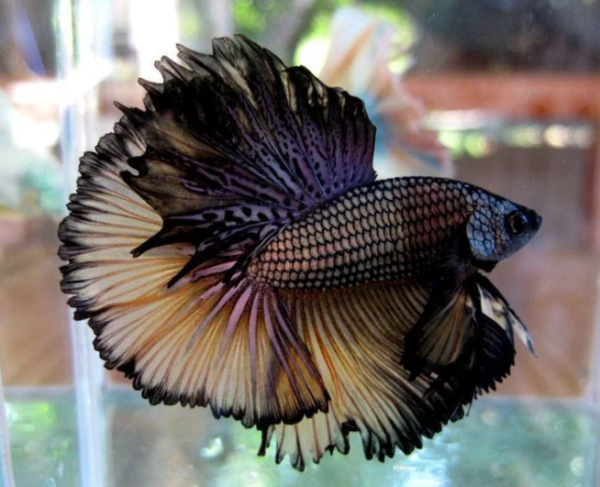Most aquarists have a panic moment when they go on holiday. What will happen to their beloved fish while they’re away? How will that precious Betta fish survive without food (if the automatic fish feeder should jam)?
So, how long can Betta fish go without food? Are they resilient against hunger, or will they almost instantly become skinny and die? So many questions, but we’ve got the answers right here so you can enjoy your holiday with peace of mind.
Table of Contents
How Long Can You Leave Your Betta Fish Without Food?

An adult Betta fish can survive for up to two weeks without supplemental feeding, but this is not something you’d want to try as many variables influence this timetable. The size of the Betta, its life stage, the weather, ambient temperature, environmental stress, and natural food in their tank all contribute to whether your Betta will make it two weeks without food (or not).
How Much Food Does a Betta Fish Require Per Day?
Let’s start with the basics. How much does an adult Betta fish eat in a day? You’d feed your Betta fish very little in a day. In fact, most Betta fish eat less than 1.8 grams of supplemental feeding in a day, fewer than 4-6 pellets.
Of course, this amount would vary if you also give them live feed, such as shrimp and bloodworms. The hard rule for feeding is to never feed more in a single meal than your Betta can eat in 2-3 minutes.
When we say that Betta fish requires 1.8 grams of food daily, it’s the maximum amount of food they should get (more or less). A Betta fish can easily not eat for a day or more. It all depends on their energy expenditure, body reserves (aka body fat), rate of digestion, and various other factors.
Why Would You Stop Feeding Your Betta Fish?
While you’d never want to stop feeding your Betta fish (just because), it’s never guaranteed that they could last two weeks without food. You may have no choice, though. Perhaps you’ve been in an accident and can’t get home for a few days, or you have to go away for work and can’t find anyone to feed your beloved Betta.
Whatever your reason for being unable to feed your Betta fish for a short period, they certainly won’t die overnight from hunger.
Let’s look at the Betta fish’s digestion and what influences their food needs so you can better understand how long your particular Betta fish can go without food.
Betta Fish and Their Natural Feeding Routine
For some guidance on what you should feed a Betta fish and how often, it’s handy to consider the wild Betta fish’s feeding routines. In the wild, Betta fish live in quiet rivers, streams, and lakes, which means they can access plant material, small crustaceans, and insect larvae. Betta fish hunt these with their upturned mouths.
Learn about Freshwater Shrimps.
When keeping Betta fish in an aquarium, it’s advisable to recreate their natural habitat, so add plants and keep live prey such as crustaceans and nanofish. In the wild, Betta fish may not always find protein-rich food every day, and while they can nibble on aquatic plants, they may also choose to fast instead.
Fasting benefits Bettas as their stomachs are small, and they can quickly become overfed, leading to digestive issues such as bloating and constipation. So, when planning your Betta fish’s routines, adding a fasting period is vital to give their digestion time to catch up.
If you are away one day per week, this would be an excellent fasting day for your Betta fish. In fact, it’s better to have slightly hungry Bettas than overfed fish, as bloat is one of the leading killers for Betta fish in aquariums.
Betta Fish Digestion Explained

Like most fish, Betta fish eat by ingesting food via their mouth, which is then crushed in their throat or esophagus. The food passes into the stomach and digestive tract, where essential nutrients are absorbed. Once the food passes into the lower digestive tract, it is compacted and excreted as fish poop.
The whole process of ingestion (eating) to digestion and, finally, defecation (pooping) takes 6-8 hours. Bettas store nutrients in fatty deposits, which give them a nice round shape.
When a Betta fish is underweight, no longer has a round shape or their sides start to look concave, it’s a sign they are using up the available nutrients faster than they can replace them, which makes them lose weight.
Influences on Betta Fish Feeding Requirements
So you have to go away on holiday or attend that dreaded work conference and leave your Betta fish without your TLC for a few days (or more). You’ve likely got your automatic fish feeder ready to ensure your Betta gets their daily 4-6 pellets, but how soon should you panic if something goes wrong?
These considerations will help you decide whether to call the neighbors and tell them to break your door to feed your Betta.
Season and Weather
While your Betta fish are tropical, and you’ve likely got the best tank heater set up to keep their water at a pleasant toasty temperature, the season does affect your Bettas and how much energy they require. In winter, your Bettas don’t need as much energy, as they won’t be quite as active.
Learn about the Aquarium Heater Setup for your Betta fish.
Also, winter with slightly lower temperatures means your Betta’s circulation slows down, which also means they will go into a more hibernated state. Of course, this isn’t as extreme as some outdoor pond fish that don’t need any winter feeding.
However, feeding your Betta too much in colder conditions is likely to block their digestive tract and cause bloat. Hence, feeding slightly less in cooler weather is wise for your Bettas. This works in your favor if you can’t be home for a few days during the colder seasons, as your Bettas are more likely to need less food.
Breeding season means Bettas will need more energy, so feed more food to ensure they can reproduce and spawn their eggs.
Tank Size
The size of the tank also influences the Betta fish’s nutritional requirements. Fasting your Betta in a larger tank means they still have more space to eat a few dropped morsels, whereas a smaller tank may have limited resources to provide a lean meal when needed.
Learn more about Community Fish for your Betta fish.
Tank Composition
Depending on what you keep in the tank with your Betta, they may survive a long fasting session by gobbling up smaller tank mates like fries, shrimps, snails, and nano fish. Bettas will also nibble on Betta-friendly plants to stay alive if they’re not being fed regularly.
It’s wise to remember that a healthy tank with other fish, plants, and crustaceans recreates a natural habitat for your Betta, and your daily feeding is supplemental (and aimed at keeping them from eating everything else).
Learn more about Live Aquarium Plants.
Fish Age or Life Stage
The life stage your Betta is in, or their age, will determine their daily nutrient requirements. A mature adult Betta doesn’t need as much daily nutrition as they have already grown into their adult body. They also have reserves built up to keep them through a fasting period.
However, smaller baby Bettas are still growing and need specific nutrients to encourage strong growth and development. If they are forced into a fasting period, these Bettas may not live as long, and they may grow stunted or not form correctly.
Bettas, in their breeding season, may also have a poor spawning period, and once the fries hatch, the females may even eat their own offspring.
The environmental components will determine whether your Betta fish will thrive during a fasting period or if they will quickly lose weight, sicken, and die.
Also Read: Betta Fish Tricks & Training – 4 Different Types Of Methods
Help! My Betta Fish Is Starved

Let’s say the worst thing happens, and you’ve been unable to feed your Betta fish for a few days or even two weeks (or slightly longer). They may have lost weight, perhaps they’ve become sickly, and they may not be looking too great.
How do you get them back to condition safely and without further stressing them out? Your instinct may be to offer your Betta fish as much food as they can eat, but this is a really bad idea and will likely cause bloat and death.
While the ideal is to feed your Betta fish 1.8 grams split into two meals per day, you won’t necessarily be able to start with this. Instead, it’s better to feed them one single pellet every four hours and gradually increase this to one pellet every three hours. Finally, after a few days, you may be close to their normal feeding routine of 4-6 pellets split in meals twice a day.
Since your Betta may also have suffered damage to their immune system due to starvation, you can take pre-emptive action and introduce a vitamin boost to the tank water or add a general antibiotic to treat any illness brewing due to their prolonged fasting.
If you have more than one Betta in the tank, they may have turned to cannibalism to stay alive, and shredded fins are often the result. Damaged fins quickly develop fin rot, so you may have to provide appropriate medication to address damaged fins and prevent secondary infections.
Feeding Steps for a Starved Betta Fish
If your Betta has been fasting for an extended period, such as a week while you were away, it’s vital to reintroduce supplemental feeding carefully. These steps will guide you:
1. Create a feeding plan to return the Betta fish to their regular feeding routine. Work according to a timer, as you need to feed at specific times.
2. Start with your Betta’s usual pellets, and only feed one pellet at a time, ensuring your Betta can swallow and digest it more effectively.
3. Wait 3-4 hours, then feed another pellet.
4. On the second day, decrease the time between meals, feeding more frequently but not more per meal.
5. Add a second pellet to every second meal by day three, but monitor your Betta carefully for signs of satiation. When your Betta feels full, they will be less eager to eat, so play this by ear.
6. It may take a few days before your Betta fish returns to their usual feeding times and quantities.
7. If your Betta doesn’t want to eat when you start feeding them, it’s worth trying live food to tempt them. However, you may need to reduce the quantity, such as only providing a quarter of a bloodworm instead of a whole worm.
8. Ensure you check for signs of illness, which can cause your Betta not to want to eat. Combining the proper medication (such as antibiotics and stress packs) can help your Betta fish regain their appetite.
Also Read: Betta Fish Series – Types Of Betta Fish – Patterns, Colors, Tails And More
FAQs
While you can include a fasting period in your Betta fish’s feeding routine, limiting this to a day or two at a time is best. A Betta fish can fast for more than a week, but extended fast periods are not advised as this causes weight loss, poor condition, and reduced immunity.
You can use an automatic fish feeder to feed your Betta fish when you are away. The feeder has different chambers that dispense a pre-measured amount of fish food at specific times of the day, ensuring your Betta fish can stick to their feeding schedule.
If you are away for the weekend and can’t feed your Betta fish, they should survive a weekend fast with no supplemental feeding. However, if your Betta fish has been newly introduced to a tank, this is not a period to suddenly change their feeding routines.
Final Feeding Thoughts
Leaving your Betta fish for a day or two without feeding is not a problem. In fact, you should plan a weekly fasting day to help balance your Betta’s digestion. However, when you are away, it’s wise to ensure your Betta has access to aquatic plants and natural food sources like crustaceans to provide some nutrition and avoid your Betta fish snacking on the other tank occupants.
Betta fish can survive up to two weeks without extra food, but it’s never a good idea to do this intentionally. Use fasting to help your Betta, but never compromise their digestive health or force them to lose weight with more than a day of fasting.
With regular and portion-appropriate feeding, your Betta fish will thrive and delight you with gorgeous displays in your tank.
Learn more about the gorgeous Elephant Ear Betta Fish.
